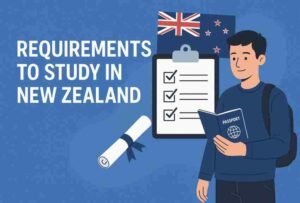Study in New Zealand
Find top universities in a secure, scenic country perfect for global students

How to Study in New Zealand: A Full How-to-Guide to Indian Students
As a globally aspiring Indian student, studying overseas in New Zealand is one of the most secure and fruitful decisions at the moment. The nation has a good degree, a serene life, and good career prospects, which are the first things that Indian students consider whenever they decide to pursue studies abroad.
New Zealand has become a destination of choice for more Indian students who desire to study in the country because it has English-taught courses, industry-based learning, and a 3-year post-study work visa. Whatever you need, whether it is engineering or business, or even in the field of IT and hospitality, the country provides you with a classroom, as well as real-world learning.
This guide will detail the process of studying in New Zealand, the price, the best universities, scholarships, admission process, and student life tailored to the needs of Indian students and first-time travelers.
Reasons to Study in New Zealand as an Indian Student
The reason why Indian students choose New Zealand is that it provides a safe environment, career prospects, and easy visa regulations. The culture is accommodating, and students feel at ease even on the first day.
Reasons why Indian students prefer New Zealand:
- All 8 universities are ranked within the world.
- English-speaking country
- Strong IT, engineering, nursing, business, and tourism employment possibilities.
- Part-time up to 20 hrs./week.
- Work visa after the study of up to 3 years.
- Secure cities and conducive societies.
- The UK, USA, Canada, Australia, and India recognize the degrees taken from New Zealand.
New Zealand is a comfort to many of the Indian students who live in New Zealand and not at home. The atmosphere is favorable, the campuses are safe and the people are welcoming, and the environment is conducive to study and personal development.
Quick Facts
Feature | Details |
Capital | Wellington |
Top Cities to Study | Auckland, Christchurch, Dunedin |
Popular Fields | IT, Business, Tourism, Agriculture |
Tuition Fees | ₹11–22 lakh/year (avg) |
Living Cost | ₹60,000–90,000/month |
Intakes | February & July (major), November (some) |
Scholarships Available | Govt. & University-based (UG & PG) |
Education System in New Zealand (It Is So Easy for Indian Students)
The New Zealand education system is also easy to acclimate Indian students as it is easy and flexible. The philosophy of the teaching is based on the practical skills, teamwork, and industry exposure; not only the theory.
Study Levels:
- Bachelor’s: 3 years
- Master’s: 1–2 years
- PhD: 3–4 years (very affordable)
Types of Institutions:
- Public Universities: research-based world world-ranked.
- ITPs (Polytechniques): professional and practical.
- PTEs: they include specialized courses such as IT, hospitality, and design.
The majority of the courses begin in February and July, which leaves Indian students with sufficient time to organize finances and visas.
Top Degrees to Pursue in New Zealand as an Indian Student
Indian students prefer New Zealand due to the courses being aligned with the requirements of global jobs. The most popular courses are the following ones:
- Information Technology and Computer Science
This has resulted in high AI, cloud, cybersecurity, data science, and software demand.
- Engineering
Civil, Mechanical, Electrical, and Software Engineering are good career prospects.
- Hospitality & Tourism
It is a practical course; NZ can be described as a global tourism destination.
- Business & Management
Indian students are fond of finance, marketing, and international business.
- Health Sciences & Nursing
Intense workload and a good pay increase.
- Agriculture and Environmental Science.
Perfect for students who are interested in sustainability and food technology
- Animation, VFX & Design
Weta Digital is based in New Zealand, thereby making it a worldwide center of creative arts.
The Process of Studying in New Zealand: Indian Admission Requirements
In case you wish to study in New Zealand, you must have met minimum academic and English-language standards.
For Bachelor’s
- Class 12 (60% or above recommended)
- IELTS 6.0–6.5 (or TOEFL equivalent)
- MOI (Medium of Instruction) is accepted in some universities.
For Master’s
- Credentialed bachelor’s degree.
- IELTS 6.5 overall
- Resume + SOP + LORs
Common Documents
- Passport
- Academic transcripts
- English test results
- Statement of Purpose
- Letters of Recommendation
- CV/Portfolio (in courses on design)
To prevent delays in visas, Indian students are advised to apply at least 4-6 months prior to intake.
New Zealand Student Visa Requirements for Indian Students
Indian students wishing to study in New Zealand have to apply for the Student Visa from Immigration NZ.
Documents Needed:
- Valid passport
- Offer letter NZ institution.
- Evidence of financial means (at least NZ$20,000/year, 8.3 lakh)
- Tuition fee payment proof
- Medical tests (if required)
- Police clearance
- Health insurance
It normally takes 48 weeks to process a visa.
Cost of Study for Indian students studying in New Zealand
Study Level | Avg Fees (INR) |
Diploma | ₹8–14 lakh |
Bachelor’s | ₹11–18 lakh |
Master’s | ₹14–22 lakh |
PhD | ₹3–5 lakh (domestic rates!) |
The international student fees for the PhD in New Zealand are among the lowest in the world.
Indian Students’ Cost Of Living in New Zealand
The cost of living will depend on where you live and how you live. The majority of Indian students do share accommodation so as to save money.
Expense | Monthly Cost (NZD) | Approx in INR |
Rent | 500–900 | ₹26,000–47,000 |
Food | 250–400 | ₹13,000–21,000 |
Transport | 60–120 | ₹3,000–6,000 |
Utilities | 100–150 | ₹5,000–8,000 |
Personal | 100–200 | ₹5,000–10,000 |
Total Monthly Cost: ₹55,000–90,000 approx.
Auckland is the highest priced, whereas Hamilton, Dunedin, and Palmerston North are low-cost.
Best New Zealand Universities to Study in as an Indian
The eight publicly funded universities in New Zealand are globally ranked and have been known to excel in research, the quality of teaching, and the support of international students. The programs available in such universities are extensive in business, science, technology, health, and arts.
Top Universities in New Zealand:
Rank (QS 2025) | University | Avg Fees (NZD) | Best Courses |
65 | 30,000–32,000 | Engineering, IT, Business | |
197 | 26,000–28,000 | Health, Science, Research | |
230 | 24,000–26,000 | Agriculture, Aviation, Business | |
261 | 25,000–27,000 | Law, IT, Humanities | |
281 | 26,000–28,000 | Engineering, IT | |
281 | 24,000–26,000 | Management, Education | |
410 | Lincoln University | 22,000–24,000 | Agriculture & Environment |
410 | 22,000–24,000 | Design, IT, Health |
NZQA recognizes and accepts all universities in the world, including India.
Indian Student Scholarships to Study in New Zealand
The major scholarships that Indian students can apply for are:
Government Scholarships
- NZ Government Scholarships
- NZ International Doctoral Research Scholarship
- Kaplan Foreign Policy Scholarships
University Scholarships
- University Of Auckland International Scholarship.
- Automatic University of Technology International Excellence Scholarship.
- The Otago Postgraduate Scholarship is granted by the University of Otago.
- Lincoln University Scholarships.
- University of Wellington Victoria University of Wellington Merit Awards.
Benefits May Include
- Partial or complete waiver of tuition fees
- Living allowance
- Travel support
Make advance applications 6-8 months in advance.
New Zealand Study Intakes
Intake | Months | Notes |
February | Main intake | Highest number of courses |
July | Second major intake | Good for PG programs |
November | Limited intake | Short courses, diplomas |
You need to apply early, as in the peak seasons, visa processing for Indian students can take longer duration.
Cost of Living in New Zealand

Popular Courses in New Zealand
Business Administration
University of Auckland
NZ$ 32,000 – NZ$ 43,000
Medicine
University of Otago
NZ$30,000 – NZ$ 40,000
Humanities, Social Sciences, Law
Victoria University of Wellington
NZ$22,000 – NZ$35,000
Art and Design, Business, Communication Studies
Auckland University of Technology
NZ$22,000 – NZ$ 35,00
Related Content
Frequently Asked Question
New Zealand comes with internationally recognized degrees, a good living standard, and accommodating properties. In 2024, it increased international student enrolments by 24 percent, and it is highly rated in terms of student experience (86 percent rated it as excellent).
By 2023, more than 69,000 international students were enrolled in the universities- an increase of 67 percent in 2022. The total number sent during the period of January to August 2024 was approximately 73,535, compared to 6% higher compared to last year.
It has two primary intakes in February (Semester 1) and July (Semester 2), and in fact has some programs with November starts. Submit 3-6 months before your commencement date.
Depending on level and institution, such as UG, PG, and PhD, tuition fees are NZ$22000-37000 / year.
The living expenses range between NZ$1,200 to 1,800/month depending on the city. This amount is comprised of shared rent, food, transport, and a personal expense.
Yes. Tertiary students pursuing courses at the degree level are allowed to work not exceeding 20 hours/week and full-time during planned holidays, e.g., summer holidays.
Based on the level of qualification and college, international graduates are allowed to have a post-study work visa for up to 3 years.
Yes. To study abroad on a full-time basis beyond 3 months, you need to apply for the Student Visa through Immigration NZ; the processing will take 488 weeks.
To apply for a visa, you would need to demonstrate a minimum of NZ$20,000/year of living expenses through the Funds Transfer Scheme.
Yes, IELTS or TOEFL is normally mandatory. Other institutions will not take a Medium of Instruction letter in case you have studied in English before.
Popular subject programs in New Zealand are IT, Business and Management, Engineering, Hospitality and Tourism, Agriculture and Environmental Science, Health Science, and Creative Arts.
NZ has a UK-type system: Bachelor’s (3 years), Master’s (1- 2 years), and PhD (3- 4 years) are offered in universities, ITPs, and PTEs, all in English.
The best places to study are in Auckland, Christchurch, Dunedin, Wellington, and Hamilton, which have good institutions and a lively student population.
Yes, there are Fulbright NZ and NZ MFAT Scholarships, PhD research grants, and university-specific awards (including tuition, stipend, or travel costs).
Yes. Since 23 June 2025, India has been included in the List of Qualifications Exempt from Assessment to allow student visas without IQA.
Yes. NZ has always been rated as one of the safest countries. 86 percent of international students rate their social experience as positive.
Absolutely. During planned term breaks and the summer holiday, you are allowed to work full-time in case you are on a course of degree course.
Use 3-4 months before the beginning of your course. The processing time is approximately 4-8 weeks, hence the necessity to apply early.
After you have your qualification from a NZQA-approved institution, you must apply before your visa runs out. Duration depends on the level and the duration of study.








